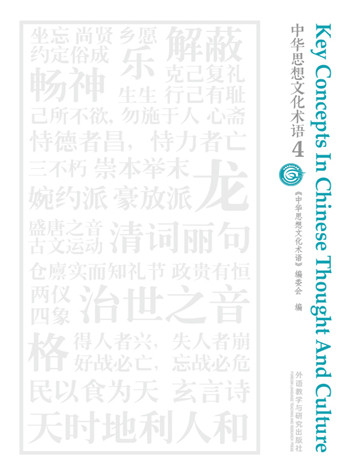100条中华思想文化术语,帮你开启了解中国历史智慧的大门。
The Chinese ideals such as “coexistence of all in harmony,” “all the people under heaven are one family,” and a world of “universal harmony” are drawing increasing attention among the international community. More and more international scholars and friends have become interested in learning and better understanding Chinese thought and culture in general, and the relevant concepts in particular.
“中华思想文化术语”是中华民族几千年来对自然与社会进行探索和理性思索的成果,积淀了中华民族的历史智慧,其所蕴含的人文思想、思维方式、价值观念已经作为一种“生命基因”深深融于中华子孙的血液,内化为中华民族共同的性格和信仰。《中华思想文化术语4》是“中华思想文化术语传播工程”的阶段性成果之一,侧重阐释中国古代的各种诗派,如“边塞诗”、“豪放派”“田园诗”等。百花齐放,或豪迈,或婉转,都为中华文坛铺下了坚实的基垫。
“Key Concepts in Chinese Thought And Culture” represents the Chinese people’s exploration of and rational thinking about nature and society over thousands of years. These concepts and expressions reflect the Chinese people’s wisdom. Their way of thinking, values, and philosophy embodied in these concepts have become a kind of “life gene” in Chinese culture, and have long crystallized into the common personality and beliefs of the Chinese nation. The Volume 4 of Key Concepts In Chinese Thought and Culture, which mainly focuses on the various schools of poetry in ancient China, like “Frontier Poetry”, “Haofang School / Bold and Unconstrained School”, and “Idyllic Poetry” etc., is one of the initial results of the Key Concepts in Chinese Thought and Culture-Translation and Communication Project. Whether the styles of poetry are powerful or elegant, the ancient poets in China have laid a foundation in the literary world for their descendants.
- “中华思想文化术语传播工程”专家团队
- 前言
- Foreword
- àimín 爱民
- ài rén yǐ dé 爱人以德
- ānjū-lèyè 安居乐业
- bǎixì 百戏
- biānsàishī 边塞诗
- biāojǔ-xìnghuì 标举兴会
- bó'ài 博爱
- bùzhàn'érshèng 不战而胜
- bù zhàn zài wŏ 不战在我
- cānyàn 参验
- cānglǐn shí ér zhī lǐjié 仓廪实而知礼节
- Chángchéng 长城
- chàngshén 畅神
- chéngrén 成人
- chóngběn-jǔmò 崇本举末
- chóngběn-xīmò 崇本息末
- Chūnqiū bǐfǎ 春秋笔法
- dàzhàngfu 大丈夫
- dāngrén-búràng 当仁不让
- dé rén zhě xīng,shī rén zhě bēng 得人者兴,失人者崩
- diǎntiě-chéngjīn 点铁成金
- fǎ 法
- fǎn zhě dào zhī dòng 反者道之动
- fàn'ài 泛爱
- fēimìng 非命
- gé 格
- gōngdiào 宫调
- gōngzhèng 公正
- ɡǔwén yùndònɡ 古文运动
- hánxù 含蓄
- hányǒng 涵泳
- hànyuèfǔ 汉乐府
- háofànɡpài 豪放派
- hào zhàn bì wáng, wàng zhàn bì wēi 好战必亡,忘战必危
- héwéiguì 和为贵
- huānghán 荒寒
- Huáng Hé 黄河
- huìmín 惠民
- jī 几
- jǐ suŏ bù yù,wù shī yú rén 己所不欲,勿施于人
- Jiàn'ān fēnɡɡǔ 建安风骨
- jiěbì 解蔽
- jīngqì 精气
- kèjǐ-fùlǐ 克己复礼
- kūdàn 枯淡
- kuángjuàn 狂狷
- lǐqù 理趣
- liǎngyí 两仪
- lóng 龙
- luàn shì zhī yīn 乱世之音
- mínxīn 民心
- mínxīn-wéiběn 民心惟本
- mín yǐ shí wéi tiān 民以食为天
- mínzhŭ 民主
- qīngcí-lìjù 清词丽句
- rénmín-àiwù 仁民爱物
- sānbùxiŭ 三不朽
- shānshuǐshī 山水诗
- shàngtóng 尚同
- shàngxián 尚贤
- shēngshēng 生生
- shènɡ Tánɡ zhī yīn 盛唐之音
- shì dé zhě chāng,shì lì zhě wáng 恃德者昌,恃力者亡
- sìxiàng 四象
- tàikānɡtǐ 太康体
- tì 悌
- tiānjīng-dìyì 天经地义
- tiānshí dìlì rénhé 天时地利人和
- tiānxià-wéigōng 天下为公
- tiányuánshī 田园诗
- wǎnyuēpài 婉约派
- wánɡ ɡuó zhī yīn 亡国之音
- wúwéi'érzhì 无为而治
- wùhuà 物化
- xīkūntǐ 西昆体
- xiāngyuàn 乡愿
- xiào 孝
- xīnzhāi 心斋
- xíng jǐ yŏu chǐ 行己有耻
- xìng'è 性恶
- xìngshàn 性善
- xuányánshī 玄言诗
- xuǎntǐ 选体
- yífēng-yìsú 移风易俗
- yǐ zhàn zhǐ zhàn 以战止战
- yǐnyìshī 隐逸诗
- yǒnɡmínɡtǐ 永明体
- yǒnɡshǐshī 咏史诗
- yuán hēng lì zhēn 元亨利贞
- yuàncì 怨刺
- yuēdìng-súchéng 约定俗成
- yuè 乐
- zhèng guì yŏu héng 政贵有恒
- zhènɡshǐtǐ 正始体
- zhìnèi-cáiwài 治内裁外
- zhì shì zhī yīn 治世之音
- zhōnghé 中和
- zìshēng 自生
- zìyóu 自由
- zuòwàng 坐忘
- 术语表 List of Concepts
- 中国历史年代简表 A Brief Chronology of Chinese History
- 版权页


















 京公网安备 11010802032529号
京公网安备 11010802032529号
笔记加载中...